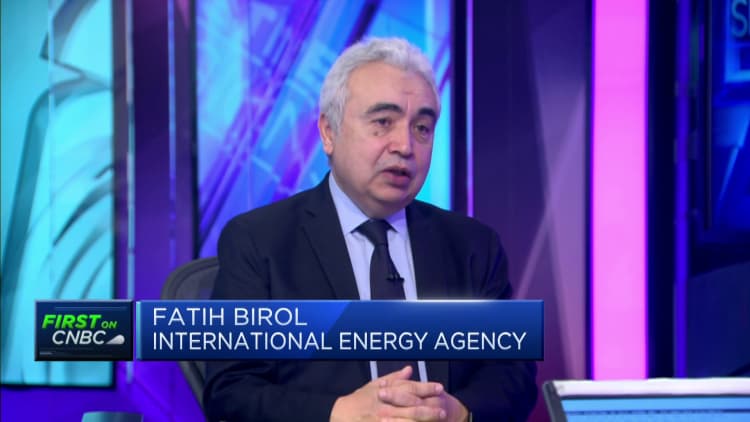IEA says developing nations are the No. 1 casualty of the energy crisis

International Energy Agency Executive Director Fatih Birol warned emerging and developing countries are most vulnerable to soaring energy prices.
“It is not the U.S. who will suffer the most [from] the high energy prices,” Birol told CNBC on Tuesday.
Birol said those who will be hit hardest include oil-importing nations in Africa, Asia and Latin America because of higher import prices and their weaker currencies.
In May, the International Monetary Fund revised down its growth projection forecasts for oil-importing nations, with higher energy prices expected to add to a litany of economic challenges already plaguing these countries.
“Higher commodity prices add to the challenges stemming from elevated inflation and debt, tightening global financial conditions, uneven vaccination progress, and underlying fragilities and conflict in some countries,” the IMF said in their report.
An oil terminal next to Doraleh Multi-Purpose Port in Djibouti. The International Monetary Fund in May revised down growth projection forecasts for oil importing nations, with the notion that the higher energy prices add to litany of economic challenges already plaguing these countries.
Yasuyoshi Chiba | Afp | Getty Images
Oil-importing Middle East and North African nations include Djibouti, Sudan, Morocco and Pakistan, amongst others.
Europe is struggling with a gas shortage as Russia slashes supplies, forcing many countries into an energy crisis in the lead-up to winter. The U.K.’s National Grid has warned of possible power cuts.
‘First truly global energy crisis’
“We are in the middle of the first truly global energy crisis,” Birol said. “Our world has never ever witnessed an energy crisis with this depth and complexity.”
He added that oil markets will continue to see volatility for as long as Russia’s war in Ukraine persists.
Birol called the decision “unprecedented,” and likened the energy alliance’s move to “scoring an own goal.”
The result of inflated prices would be an economy “flirting with a recession,” which he cautioned will lead to an environment that is neither good for buyers nor sellers.
LNG prices
Birol also said he expected the world to “continue to see high LNG prices,” citing China’s rebounding economy and Europe’s need to import more energy.
According to Birol, LNG prices in the Asia region are five times higher than the last five years on average, and next year will see more challenges.
“Europe wants to buy LNG, China is coming back as a major LNG importer, and there is very little new LNG capacity coming into [the] market,” he attributed as reasons.
Soaring energy prices plaguing global markets could offer much-needed impetus to nudge governments to invest toward moving away from dirty energy.
An aerial of the Strategic Petroleum Reserve storage at the Bryan Mound site seen on October 19, 2022 in Freeport, Texas. The main casualties who will suffer the brunt of high energy prices is neither the United States nor Europe — but emerging and developing nations, said the head of International Energy Agency (IEA) Fatih Birol.
Brandon Bell | Getty Images News | Getty Images
“We shouldn’t forget that this crisis is giving impetus to many governments around the world to put huge amounts of money [into] clean energy transitions,” Birol said.
He cited the recently enacted Inflation Reduction Act. The White House says the climate investment will reduce costs related to rising temperatures, minimize property damage from sea level rise and other disasters and reduce health impacts such as premature death.
For all the latest World News Click Here
For the latest news and updates, follow us on Google News.

